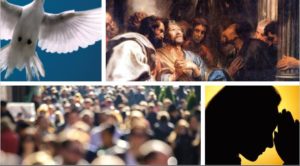A reader asks: “We hear a lot about Matthew 7:1-5 regarding a log in your eye, but not much about verse 6. What is that talking about and how does it relate to the earlier verses?” Mark D. Taylor, CEO of Tyndale House Publishers and Director and Chief Stylist for the New Living Translation Bible Translation Committee, agreed to share his thoughts on this topic.

Good questions! Let’s take a look.
First of all, the series of teachings in Matthew 5-7 is often called the Sermon on the Mount. But the text in this extended section probably does not reflect everything Jesus said at that time. Rather, Matthew has organized it as a series of teachings on various topics. Any specific topic does not necessarily relate to the topics before or after it.
For example, the pericope (short section) in 7:1-5 relates to the hypocrisy of judging others when we have sin in our own lives. And isn’t the metaphor of a log in the eye wonderfully descriptive?!
Then we find the pericope (7:6) about throwing pearls to pigs. How does it relate to the previous verses? Scholars have differing opinions on that issue. My perspective is that the two passages are not specifically related to each other. Verse 6 uses metaphoric language. Here’s a very literal translation, as found in the NRSV:
Do not give what is holy to dogs; and do not throw your pearls before swine, or they will trample them under foot and turn and maul you.
The NLT provides a dynamic translation of “dogs” as meaning “people who are unholy.” And as it often does, the NLT footnote provides a more literal translation.
Don’t waste what is holy on people who are unholy.* Don’t throw your pearls to pigs! They will trample the pearls, then turn and attack you.
7:6 Greek don’t give the sacred to dogs.
Jesus is giving very practical advice, though it is presented in very colorful and poetic language. We can easily imagine how silly it would be to throw a string of expensive pearls to a herd of pigs. The pearls would be destroyed and the pigs would not be the least bit appreciative. In the dietary laws of the Old Testament, pigs and dogs were both considered unclean (Lev. 11:7, 27). So Jesus uses dogs as a metaphor for people who are unclean, or sinful. He is telling his listeners—including us today—that it is useless to give what is holy to people who are unholy.
The notes in the Life Application Study Bible make this application at Matt. 7:6: “Jesus says that we should not entrust holy teachings to unholy or unclean people. It is futile to try to teach holy concepts to people who don’t want to listen and will only tear apart what we say. We should not stop giving God’s Word to unbelievers, but we should be wise and discerning in our witnessing, so that we will not be wasting our time.”

If you have a question let us know in the comments or reach out on our social media pages. You can find us on Facebook, Twitter and Instagram. We will try to answer your questions here on the blog.













Recent Comments